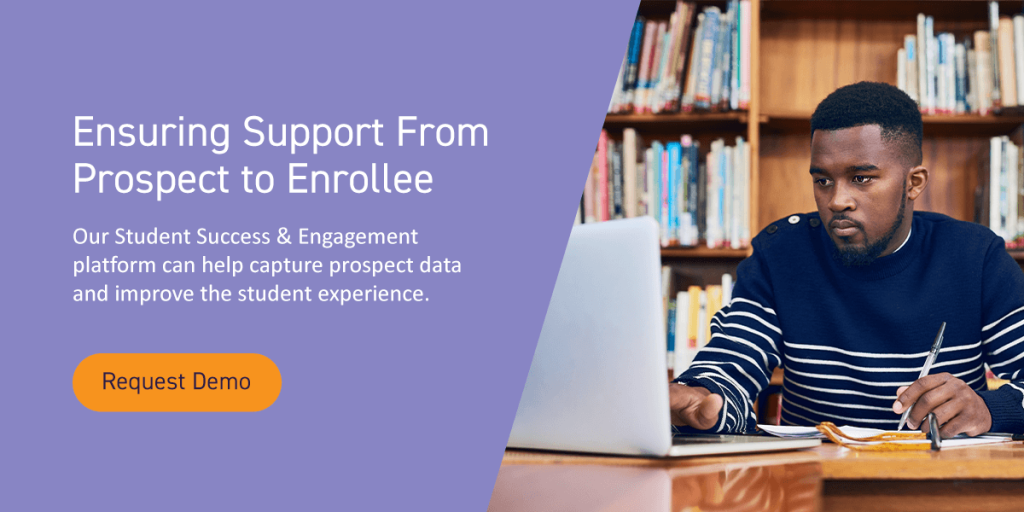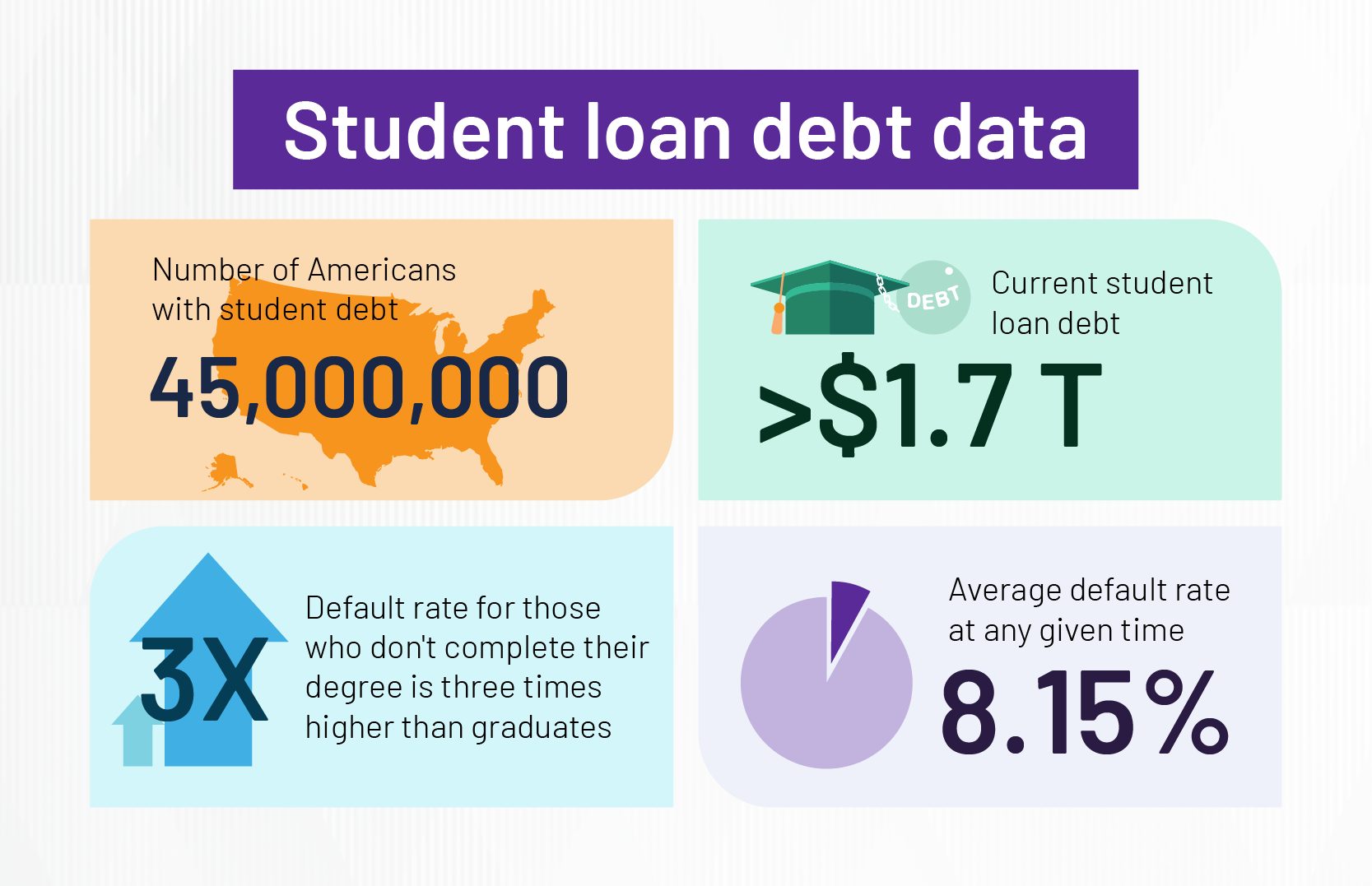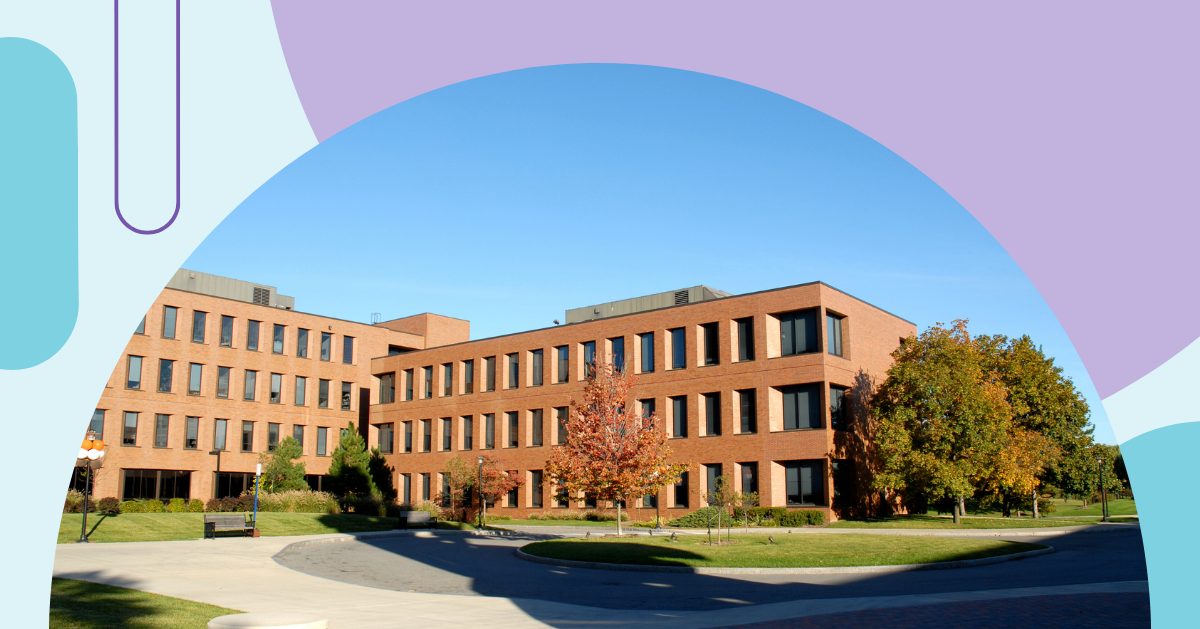Higher education is at a critical moment in history. Student support needs have risen dramatically during the COVID-19 pandemic amid a mass exodus of higher education personnel flocking to jobs in the private industry in pursuit of better work/life balance, higher wages, and attainable goals. As remaining staff attempt to fill the massive gap between student expectations and available support, small to mid-size institutions are struggling to keep up.
To make matters worse, many colleges and universities don’t have the robust technology necessary to provide adequate student support. Data silos made prevalent by technology sprawl, manual processes that break rather than bend with volume, and reactive support are the norm, resulting in a worsening student experience.
Nowhere is this disconnect between technology and support staff more apparent than when prospective students attempt to enroll in a new college or university.
Prospective students share a wealth of valuable information with institutions well before they are ready to enroll – information that is often lost due to traditional advising technologies being tailor-made for enrollees, not prospects. When institutions fail to record past interactions between prospects and support staff, the prospect will often find themselves answering the same questions repeatedly, making them feel undervalued and unsure of what the next steps are to enroll.
This is an even bigger issue for first-generation students. Without a guardian or family member to guide them, these students often feel overwhelmed navigating cumbersome enrollment processes and can fail to complete all the necessary steps required to begin their higher education journey. Data management challenges during student onboarding detract from the mission of access-focused institutions, which impedes their ability to efficiently get new students enrolled.
Watermark partnered with McDowell Technical Community College (McDowell Tech) starting in November 2021 to tackle this challenge of lost data along the prospect-to-enrollee journey. Read on to learn about the results of this project, and how these findings could help your own institution.
The Watermark and McDowell Tech Community College Partnership
Watermark partnered with McDowell Tech starting in November 2021 to tackle this challenge of lost data along the prospect-to-enrollee journey. McDowell Tech is a community college, located in Marion, North Carolina that serves the historically underserved community of McDowell County. Over 15% of the service area population over 25 years of age has less than a high school education. McDowell Tech is actively working to decrease this number. An alignment in values and mission made the partnership with Watermark and McDowell Tech a clear fit for this project. Watermark worked closely with McDowell Tech to enhance the Watermark Student Success & Engagement platform with functionalities to capture prospect data and improve McDowell Tech’s student experience.
Challenges to achieving the ideal student experience
There are a number of different challenges that McDowell Tech faced that prevented them from creating an ideal student experience. These challenges are not unique to McDowell Tech, in fact, many colleges face similar difficulties.
The overarching challenge was that McDowell Tech did not have one, consolidated source of truth for all prospect-to-enrollee data. This led to siloed knowledge and limited decision-making abilities. Next, many of the processes to attempt to gather and store prospect data were very manual and would break down at scale (ie: collecting individual prospect’s information and handwriting it on contact cards that were then distributed by hand to department heads). There was a lack of a unified student view because the knowledge about these prospective students lived mainly within the individual recruiter’s minds, which would sometimes lead to the prospect having to repeat their story multiple times. Nearly all of these processes were reactive rather than proactive. Finally, because all of the data was scattered, or not collected at all, insights were difficult to excavate. In order for McDowell Tech to reach the ideal student experience and specifically meet the goals outlined in their Vision 2025, they knew that they needed to make some changes to their processes, build partnerships, and incorporate technology that could support their needs.
Partnerships needed to accomplish the vision
The ideal student experience cannot be established overnight. Yet, through the right partnerships, McDowell Tech created a strategy to reach this goal. The key relationships that McDowell Tech focused on were: high school partnerships, parents, community resources/organizations, and technology vendors. Tapping into the strengths of each of these partners increased the chances of success for every student.
High school partnership
McDowell Tech’s high school partnerships were facilitated through the Career and College Promise (CCP) program. This program’s success primarily relies on high schools that are willing to partner with them to support these students. Through CCP, eligible high school students are allowed to dually enroll in community college courses while completing their high school diploma. This gives these students the opportunity to get a jumpstart on their college education, setting them up for greater success. This program is free of charge, and thus really benefits disadvantaged students who may have a difficult time paying for college. This is also a great feeder for McDowell Tech because many of these high school students then turn into full-time enrolled students at McDowell Tech after high school graduation.
Parent partnership
The parent partnership goes hand in hand with McDowell Tech’s collaboration with high schools. Dr. Beverly Watts, Dean of Student Success at McDowell Tech, noted that “as soon as the high school parents are on board with CCP, the word spreads like wildfire” (B Watts, personal communication, October 3, 2022). While the high school students can build excitement for the program as well, Dr. Watts explained that it’s really important to get the parents on board because they still have a fairly significant amount of influence on their children and care deeply about their education. Once the parents are educated about this program, they are very likely to talk about it with the other students’ parents, which encourages those parents to enroll their children in the program as well. By including the parents at the beginning, students are more likely to receive educational support at home, boosting their chances for academic success.
Community partnership
McDowell Tech also built partnerships with community organizations such as CULA (Centro Unido Latino-Americano), to reach a broader base of students more effectively. CULA is a non-profit organization that serves the Latinx community of Marion, North Carolina, providing resources for food access, health care, foreign affairs, and education. By partnering with organizations such as CULA, McDowell Tech is able to tap into their rich knowledge of the Latinx community and more effectively serve this often underserved portion of the student body.
Vendor partnership
In order to accurately and easily document their efforts toward reaching an ideal student experience, the final relationship that McDowell Tech focused on was a technology vendor partnership. Watermark was chosen for this partnership because of its capabilities to track communications and follow a student’s progress from prospect, to enrollee, to graduate. Prior to this relationship, McDowell Tech did not have any technology to fill this function. Using Watermark’s software has greatly benefited McDowell Tech, and they plan to continue using this platform long into the future.
The solution
The ideal student experience can only be reached if a prospect’s experience is prioritized from the very first interaction with the college or university they are interested in. The Watermark Student Success & Engagement functionalities that were developed through this project ensure that prospective students are receiving personalized communications from their first encounter with an institution. Additionally, these features support student success throughout the entire student lifecycle, from prospect through graduation. Specifically, advisors will have a more comprehensive understanding of the communication that is sent to their advisees, they will have ample data about the prospect after they convert to an enrolled student, and they will have much greater insights into where prospects are on the prospect-to-enrollee pipeline.
These new functionalities were built to meet not only the needs of McDowell Tech, but the needs of small to midsize institutions throughout the United States. There are six modules that make up the CRM functionalities within Student Success & Engagement, and each of these modules were designed, built, deployed, and implemented at McDowell Tech. As an early adopter of this product, McDowell Tech tested and provided feedback for each iteration of the functionality.
Developing the technology is often the easy part. The bigger challenge can be the change readiness of the institution to adopt the new technology. To help institutions successfully implement new solutions, a strong partnership must be developed with the vendor to ensure the institution is set up for success through initial implementation and ongoing consultation.
Watermark and McDowell Tech started this project by taking a deep dive into the college’s current processes. Once the processes were documented and the pain points identified, Watermark verified that the right solutions could be developed within their technology. Then, the team mapped out what the future processes would look like. Finally, Watermark held onsite working sessions and trainings with the McDowell Tech team to ensure there was alignment on future processes and to confirm that McDowell Tech felt as comfortable as possible with their new solution.
Implementation of a new solution is a journey, not a singular event. Institutions are often faced with multiple large changes at once, and as a partner, Watermark plans to coach McDowell Tech through any changes that arise and support them through continuous improvement opportunities during the lifetime of their partnership.
Developing Department-Level Spaces
Prior to the implementation of Student Success & Engagement, McDowell Tech found themselves bogged down in cumbersome processes. They were spending too much time searching for the needed information, which interfered with their ability to provide an ideal student experience. To solve this challenge, Department-Level Spaces (Instruct, Recruit, and Advise) were added to the Student Success & Engagement platform. Within the platform, now users will only have access to the tools, student information, and data that is necessary for their position at the institution. System administrators can turn the different modules on or off to align the solution directly with department-level needs.
For example, recruiters can enter through the Recruit App and have access to the recruiting tools needed to engage effectively with prospective students. Advisors will enter through the Advise App and similarly will have access to the tools needed to successfully support the enrolled students they are advising. While individuals enter and use different apps, a single foundation of data is being used to ensure a holistic view.
McDowell Tech’s users have responded really positively to this change in their system. They appreciate the way it has streamlined their processes and has minimized any noise or distractions, thus allowing them to spend more time supporting the students.
Building centralized storage and easy uploading for prospect data
Another challenge that McDowell Tech faced was the lack of a centralized location to store information about prospects. Student Success & Engagement previously focused solely on the enrolled student by importing the necessary data from the institution’s Student Information System (SIS) and Learning Management System (LMS). This is why we built in the capability for the institutions to import prospective student data. This can be completed individually by completing a form, via CSV (Comma-separated values) file, or via a data feed that is automatically pulled in from the institution’s student information system (SIS).
Now, as McDowell Tech travels to community events or visits high schools, they can collect prospective student information on an Excel spreadsheet and easily upload it to this centralized location. This information can be easily reviewed by the next faculty member who will be interacting with the prospective student, decreasing the number of times a prospective student must repeat the same information, and the more knowledge the entire support team at the institution will have about that student. McDowell Tech now has one central hub to store all prospect data and can ensure all appropriate people have the information that they need.
Building Outcome-Aware Campaigns for more strategic communications
McDowell Tech lacked a consistent method of communication with students, which led to students receiving duplicate messages through various platforms, each in a different format, with varied tones. This did not create a positive experience for the prospects or currently enrolled students.
To help unify this communication, Watermark built Outcome-Aware Campaigns. The campaigns feature allows McDowell Tech to design and build engaging and personalized messages, incorporate specific calls-to-action, and then send this communication to a targeted group of prospects or enrolled students.
In one of the more recent campaigns, McDowell Tech’s call-to-action was encouraging current students who had yet to enroll for the Fall term to complete their Fall registration. They were very successful – 111 students enrolled in classes as a direct result of this campaign (27.75% of the 400 campaign recipients)! These campaigns provide the personalized communication and encouragement that students need and desire, as well as clear instructions for what actions need to be taken next. This led to a measurable ROI for the institution; only looking at tuition fees, the campaign was the catalyst for approximately $73,000 of additional revenue.
These campaigns have already made a large impact on McDowell Tech’s students as well as the institution overall. According to Dr. Merritt, “This project showed the importance of having one point person who is responsible for the communication with the students from prospect, to enrollment, to graduation, thus creating a consistent experience. The deeper we got into this project, it accelerated the awareness that this needed to be under one roof” (B. Merritt, personal communication, October 26, 2022).
Development of message logging
Email communication at McDowell Tech was quite siloed. Emails were sent to prospects from a staff member’s individual email, meaning that this communication is only known by the sender, receiver, and those who were CC’d (if applicable). Oftentimes, the prospect or student’s entire support team (faculty, advisors, coaches, etc) could benefit from knowing the information that was passed between the sender and receiver. To solve for this siloed communication, Watermark built Message Logging . Any messages that are sent within the messaging functionality within Student Success & Engagement can be saved to the messages tab within the student’s record. This is an opt-in feature, and senders are encouraged to use their best judgment to ensure privacy.
In an interview with Watermark, Chuck Bowling, Title III Activity Director, said “We understand better the gaps in our communication and we see a path forward for developing a communication plan that is comprehensive and personalized through the integration with technology” (C. Bowling, personal communication, October 31, 2022).
Development of Pipelines and Opportunities
McDowell Tech previously did not have insight into where a prospective student is in the pipeline from inquiring about attending McDowell Tech, to eventually enrolling at McDowell Tech. Most of this knowledge lived inside the minds of the recruiters or potentially on disparate spreadsheets and documents. McDowell Tech also wanted a way to focus on re-engaging students who have dropped out. This process was difficult for staff members because they lacked clear visibility into what communications had already occurred.
To solve this challenge, Watermark built Pipelines and Opportunities. These pipelines will contain configurable stages to track the progress of the prospect or student through the pipeline. In order to move on to the next stage, the prospect or student will need to have completed a certain step(s). Anyone at McDowell Tech with access to these pipelines will have visibility into where a prospect or student is within the pipeline, and they’ll be able to send specialized communication to that group and help them move closer to their end goal of that pipeline.
Pipelines and Opportunities are available to each Space. For example, if the advising team wants to enable pipelines for the Advise space to track current students who have not enrolled for a future term, and track those students through a multi-stage workflow, this functionality is now possible. Finally, they will be able to assess how well the process is performing and if adjustments need to be made to the process at any point throughout the pipeline.
Expansion of reporting functionality
McDowell Tech found excavating insights to be quite difficult, especially when data is strewn across multiple different platforms. It is challenging, if not impossible, to truly make data-backed decisions without easy access to clear data. This is why we expanded our reporting functionality, specifically to include clear reporting of the prospect to enrollee pipeline. McDowell Tech can report on every stage of the pipeline:
- Prospect to Applicant Rate
- Applicant to Enrollment Yield Rate
- Enrollment FTE by Term
- Total Enrollment by Term
- New Student First Term Course Completion Rate
- New Student First to Second Term Persistence Rate
McDowell Tech is very much looking forward to streamlining their decision-making capabilities by utilizing these reports to understand where the prospective students are falling through the cracks and how they can focus their outreach on specific aspects of the pipeline.
Conclusion
This project with McDowell Tech has validated that there is a strong desire for CRM functionalities to be embedded within a student success technology offering. In addition to McDowell Tech, seven additional institutions have signed on to use the CRM functionalities within Student Success & Engagement.
The initial investment by the Bill & Melinda Gates Foundation made this project possible. However, additional investment will be required of both public and private entities including solution providers, non-profits, and colleges themselves to continue to finesse and implement this technology. While this effort can seem daunting, the project brings higher education one step closer to offering student support at scale for underserved institutions and the students they represent.
















































































































































































































































































































































































































